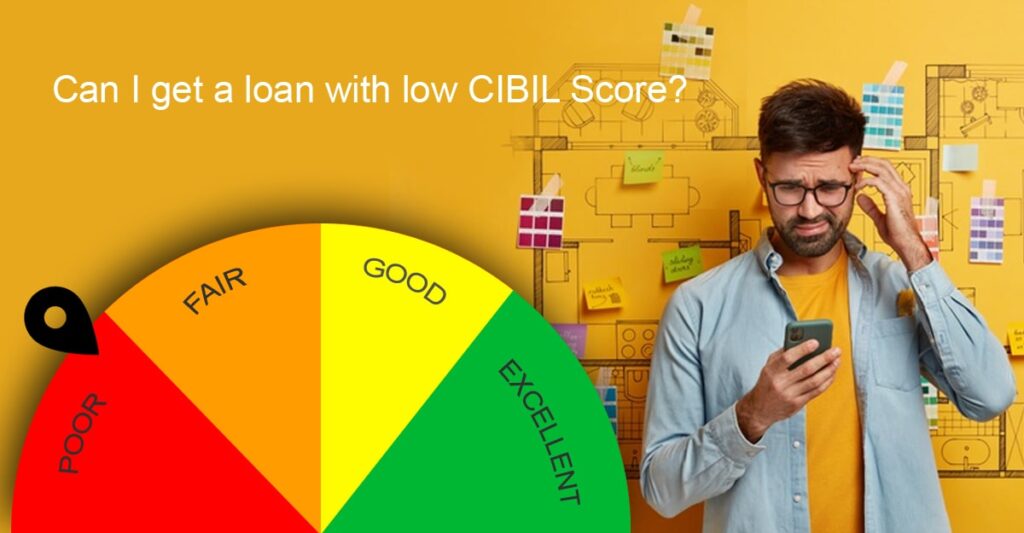Before approving a loan application, the lender considers the applicant’s credit history. This is why a low CIBIL score will make obtaining a loan difficult. When you have a poor credit score, that means you’re a high-risk borrower, and banks are less likely to lend you money. A credit score is determined largely by how well you have repaid existing debts, whether you have defaulted or pre-paid any loans, the kinds of loans you have taken, and how much of your revenue goes toward debt repayment.
If you have a poor credit score and still need a personal loan, you will be able to find some lenders that will lend you money, but they will normally charge a high-interest rate. Some lenders bill as much as 30-40% p.a., which is incredibly high.

Table of Contents
Importance Of CIBIL
Your creditworthiness is determined by your CIBIL score. The Reserve Bank of India (RBI) has approved the Credit Information Bureau (India) Ltd., also referred to as CIBIL, to measure this score for a person.
Your CIBIL score is determined by how well you repay your current debts. You can maintain a high credit score by making on-time payments on all of your unpaid loans, such as credit cards, loan EMIs, and so on. Defaulting on a loan, on the other hand, lowers the credit score. CIBIL defaulters are more likely to be refused personal loans than people with a strong financial background.
A valid CIBIL score ranges from 300 to 900, with 900 representing the highest degree of creditworthiness. The higher your credit score, the more likely your loan application will be accepted.
A CIBIL score of 750 or higher qualifies you for almost every form of a loan. A personal loan with a CIBIL score of 550 or less, on the other hand, may result in denial or a higher interest rate, based on the lender’s policies, since you may be considered a “high-risk” borrower.
Obtaining Personal Loans Despite a Low Credit Score
Even though it would be difficult, you can still get a personal loan with a bad credit score with the following ways
Provide proof of income to back up loan repayments
You may have a bad credit record, but an increase in pay or the inclusion of another source of income may convince the lender to approve your loan application. Furthermore, if you can demonstrate that you have a stable career and a consistent income stream, the chances of having a loan accepted improve. You should be aware that you will be charged a higher interest rate.
Think about getting a small personal loan.
If you request a large personal loan sum with a low CIBIL score, your lender will view you as a high-risk nominee. Your chances of defaulting on the loan payments are greater, according to the lender.
If the personal loan is for a smaller sum, the lender will be more willing to approve the offer. Also, repaying a smaller cost would be much cheaper.
Obtain a guarantor or apply for a joint loan.
Even if your CIBIL score is poor, if you have a reputable and trustworthy guarantor or joint borrower, your loan application will be accepted. This provides banks with the guarantee that the debt will be paid back, making personal loan acceptance simpler. Ensure that the KYC formalities are fulfilled, along with the requisite signatures on the appropriate documents, with approval from the co-applicant or guarantor.
When a lender sees a co-applicant or guarantor on your loan application with a decent CIBIL ranking, it certainly lets you get a better price.
Correct Credit Report Inaccuracies
With a low CIBIL ranking, you can find it difficult to obtain a personal loan. However, there is a risk that the credit report includes mistakes or misreporting. This is most likely because your record hasn’t been updated with the most recent records.
Although it is not your fault, errors like these will lead to unwelcome results. Check your CIBIL score daily to keep ahead of the game. If you notice any mistakes, make sure to report them to the appropriate authority as soon as possible. Finally, it would benefit you by improving your credit score, making you a more suitable candidate for a personal loan.
Attempt to increase the CIBIL score.
A decent CIBIL score will assist you in securing faster and less costly personal loans. It doesn’t have to be a major change; even minor adjustments will help you increase your ranking. You should, for example, avoid changing your credit card regularly and check your CIBIL report for inaccuracies regularly. Refer to our previous blog for more detail about how to raise your CIBIL score in 5 basic measures.
Take out a loan from a non-banking financial institution.
A loan from an NFBC is much easier to obtain than one from a commercial bank. Many NBFCs provide no paperwork and immediate personal loan disbursement, and they don’t even consider the CIBIL ratings. For example, EarlySalary provides immediate personal loan disbursement of up to $55,000, which is deposited directly into your account. It doesn’t even take the CIBIL score into account.
What do you do if your Cibil score has dropped?
Don’t take out any new loans.
Your net worth is equal to your assets (cash, savings, real estate, and so on) minus your liabilities (loans, credit card bills, etc). A drop in credit score is often followed by a drop in net worth. Don’t make things worse by taking out more loans. Maintain a minimum credit score and only apply for a new loan if you reach the goal (say 720). Applying for a loan lowers your credit score because banks and financial institutions can run a credit report query with a credit bureau (such as CIBIL), which lowers your score. Loans also come with interest and processing fees, which can be very large at times.
Credit card spending should be reduced.
The percentage of your credit card limit that you have used up is a vital part of your credit score. Your credit score decreases as your utilization percentage rises. This is because financial institutions note that you are credit-hungry and begin to deny you new loans or credit cards. Until your credit score improves, move your credit card spending to a debit card. This would lower your loan utilization rate and boost your credit score.
Repay any EMIs that are past due.
Loan hold-ups The most popular explanation for a credit score decrease is an EMI. The bank or financial institution records each missed EMI or credit card payment to four credit bureaus (CIBIL, Experian, Equifax, and CRIF), which appears in red or orange on your credit report. Pay off any late EMIs or credit card bills as soon as possible. This will necessitate restraint and the elimination of any other avoidable costs. Remember that your credit history is irreversible and will follow you for the rest of your existence. It should not be lit in red. If you’re behind on your Credit EMI, go to Creedy’s payment page and make your payment. It is also possible to pay in installments.
Budgeting
A lot of the time, financial stress lowers your credit score. It may be due to a medical condition, work loss, costly life events such as marriage, or sudden emergencies. You should look for ways to cut costs (by avoiding needless expenses) and increase income (for example, by hiring a partner or working an extra shift). This seems easy, but it is difficult to put into practice. It will take time to see results. For some time, you will need to be disciplined (at least 6 months). Once you’ve hit your perfect credit score, you can unwind for a while and resume some of the transactions you put on hold. However, keep an eye on your credit report at all times.
Monitoring
There’s an adage that says if you can’t calculate it, you can’t change it. Similarly, if you can’t track anything, you won’t be able to say if your attempts to change are successful. At least once a fifth, you can review your credit report. Take a look at the following:
If all of the data is right. Financial institutions sometimes disclose incorrect information. If this is the case, you can contact them right away and suggest that they fix it within 30 days.
Conclusion
Getting a personal loan with a low CIBIL score is difficult. But With the growth of the fintech industry, there are now many opportunities for having a loan with a low CIBIL score.
Since the bank’s primary interest is whether or not a person would be able to repay the loan, you can gather all financial records relating to all of your sources of income. This will demonstrate to the banks that you can repay the loan notwithstanding your poor CIBIL ranking, which will result in your loan application being approved.
I’m Shiv Kumar, a graduate with a passion for finance, marketing, and technology. My journey into finance started with a desire to understand money management and investing.
Our main goal is to empower individuals through financial education. We believe that everyone should have the opportunity to build a strong financial foundation. Whether you’re a seasoned investor or just getting started, we provide articles, guides, and resources to help you navigate the financial landscape.
I invite you to join our community of financially savvy individuals. Feel free to ask questions, engage with our content, and explore the topics that matter to you. Together, let’s take control of our financial futures.




